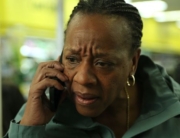Shouting with spontaneous glee out of their car windows, a group of youngish professionals and their children head out on a carefree trip to the beach. A sense of freedom and adventure fill the air. The addition of a pretty stranger to the group as a possible love interest for an eligible man adds a hint of romantic promise. What could go wrong?
Oh, everything. We know we’re speeding on the highway to hell pretty darn soon in this 2009 film by Asghar Farhadi, director of the infinitely more satisfying and sophisticated A Separation. The trip gets off to an iffy start when its vivacious organizer (Golshifteh Farahani) pulls strings to rent a villa that is rundown and dirty—at first a bit of a lark for the gang, then a spot-on setting for the misery set to unfold. Pay no mind to the Von Dutch knockoffs and highlighted hair, we are in modern Iran, where prohibitions between men and women complicate routine encounters and class resentment festers beneath polite manners. It’s going to be a long weekend.
And boy, is it. Repetitive scenes establish that the vacation is going just swimmingly, although awkward moments arise. Elly (Taraneh Alidousti), the pretty young woman invited for the weekend, seems a little evasive and preoccupied. Perhaps as a kindergarten teacher, she is out of her depth in this more upscale crowd. Although no one really knows Elly, she is charged with looking after the children on the beach. One of them nearly drowns. When panic subsides the stranger is nowhere to be seen. Where has she vanished? Elly apparently had secrets to hide, and she was not the only one. And her status as a single woman without a chaperon may have left the group on something of a hook with Elly’s family and local authorities.
The trauma of a near-death and the enigma of Elly’s disappearance put a cork in the buddies’ forced gaiety. Relationships start to crack and explode. The film collapses at this point into a finger-wagging recital of maxims spelled out schematically and often. These include:
No good deed goes unpunished
Meddling in other peoples’ business brings trouble
Country folk and city dwellers don’t mix
Inviting a stranger into a group stirs latent tensions to the surface
We think we know the people around us, but we never really do
Secrets are terrible for marriages
When we tell one lie, we build a mountain of deceit
All these worthy points are illustrated with acting alternately overblown and underplayed, its weaknesses and sometimes considerable strengths given maximum exposure in lengthy takes. Peyman Moadi, so commanding and stern as the soon-to-be divorced father in A Separation, plays a more immature, callow character with much preening, nostril-flaring, and sighing. Merila Zarei brings a resigned note of fed-up realism as a wife who harbored doubts about Elly from the get-go. Golshifteh Farahani cries a lot. The cast is too big, and excessive flailing takes place. Crucial scenes occur off-camera and are dutifully recounted by the actors, although others play out for what seems like a very long time on screen.
Societies may be based on lies, but the film hints that Iran may rest on a wider bedrock of falsehoods than others. Not that the foundation is a steady one—deceptions floated by the group to deal with their predicament look laughably flimsy and unconvincing, culturally rooted though they may be. Childish fibs and hysterical reaction to problems stretch patience and belief. By the time some of Elly’s secrets have been revealed, the movie builds to an atmosphere of sorrow and grief, and it’s a laborious haul getting there.
A cursory Internet search reveals that About Elly has been showered with praise as a taut whodunit, an indictment of sexual inequality, and a mystery on a level with Antonioni’s L’Avventura. Regrettably, I cannot share these glowing assessments. To me, this was an early effort for Farhadi before hitting his stride with A Separation, a devastating film that had much more to say about lies and evasions in sharper, leaner terms.

















Leave A Comment